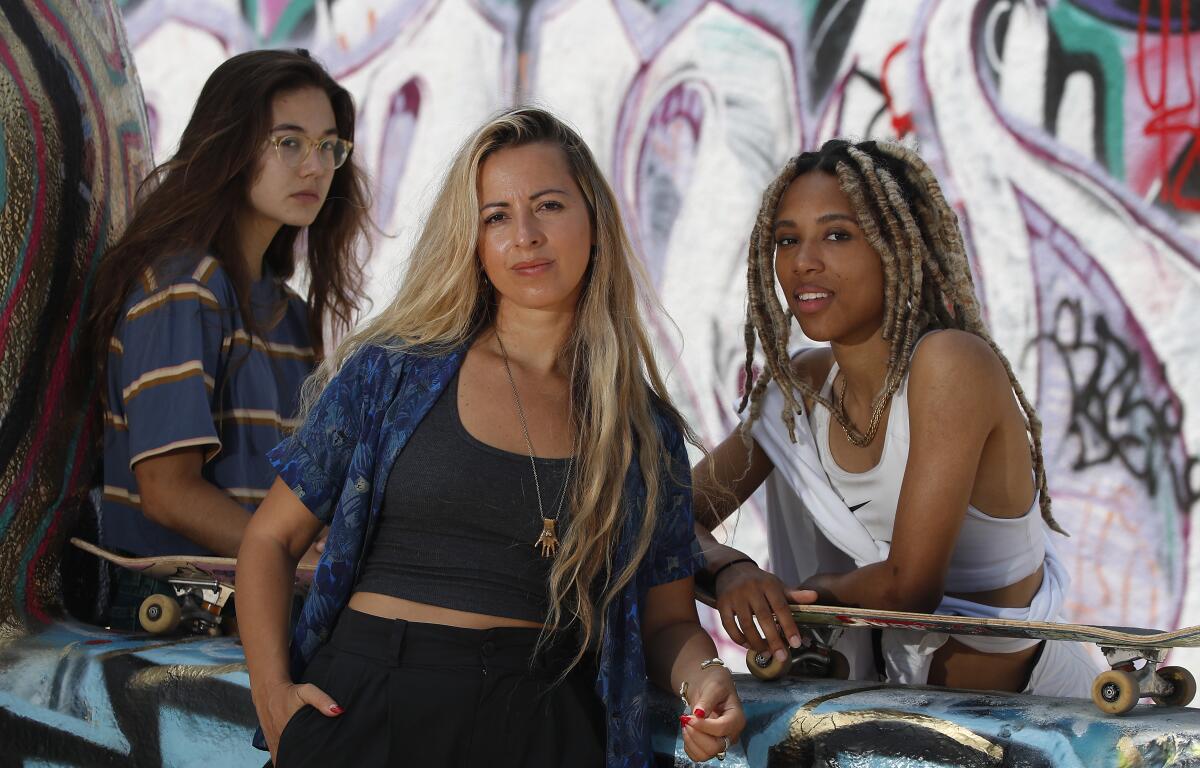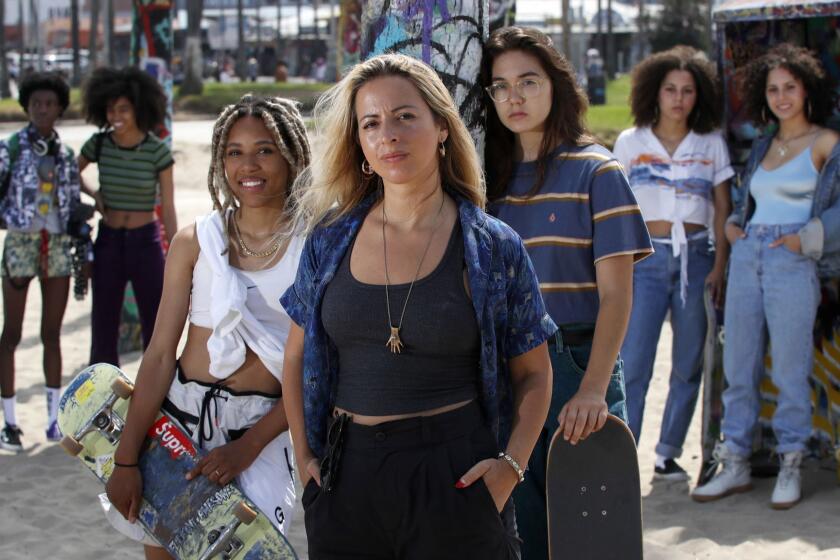First they fought sexist trolls. Now they’re behind HBO’s skateboarding masterpiece
- Share via
Crystal Moselle is the creator and director of “Betty,” a show about female skateboarders in New York City. Its second season begins June 11 on HBO and it is even better than the first, which made for one of the best shows of 2020 if my own top 10 is anything to go by.
A show about beauty — as well as friendship, community, gender, power, empowerment and the correctable dopiness of dudes — “Betty” is beautiful itself. (You could turn down the sound and still be moved by the skating, by the faces.) It isn’t long on plot, but a lot of things happen across each six-episode season without seeming busy or rushed or left by the wayside. It’s involving without being expressly dramatic, exciting without telling you to be excited — a fly-on-the-wall fiction, built on the experiences of a from-the-streets cast one can no longer call nonprofessional.
From the buzzed-about to the under-the-radar, the Times TV team selects the shows to queue up for your nights at home this summer.
“I want to create stories that really make people feel that they’re immersed with the characters in the moment, being with them, being a part of that world,” Moselle said recently by telephone from New York, where the California native has lived and worked since graduating from the city’s School of Visual Arts. “I was interested in video art before film, in the more experimental side of things. I went to a summer program at Otis College [of Art and Design], a video art program — I tried to do all these short films where I planned it out and wrote a script and they always just ended up … trash. And then I started taking the camera around with me and capturing moments.”
After years of anonymous commercial work, Moselle broke into public view in 2015 with “The Wolfpack,” a Sundance prize-winning documentary about six brothers who grew up in isolation in a small apartment in lower Manhattan, kept by their father from the corruption of the outside world but watching and re-creating films like “Reservoir Dogs” and “The Dark Knight” in their small apartment. She had spotted them moving as a group on an early foray into the street and, curious, engaged them. The road to “Betty” began similarly, when Moselle crossed paths with skateboarders Nina Moran and Rachelle Vinberg on the subway. “They were funny, and there was an aura of charisma around them,” she recalled.
Moselle introduced herself, and when the fashion brand Miu Miu asked her to make a short film for its “Women’s Tales” series — other directors have included Ava DuVernay, Miranda July and Agnes Varda — she got in touch with the pair, who got in touch with some other skating friends. The result was 2016‘s “That One Day,” which led to the 2018 feature “Skate Kitchen,” which led to the TV series “Betty.” (The title ironically refashions a term for girls who hang around boys who skate.)
“I think that, as the collaboration goes on, they’re becoming their characters rather than themselves,” Moselle explained. “It’s more like ideas and things that are happening within their world, people they know that we’re bringing in. Season 2 definitely is not inspired by their personal lives; it’s talking about what could happen.
Whether you’re a newcomer or a committed fan, our week-by-week guide to HBO’s crime drama will help you understand all things “Mare.”
“When I was making the documentary on the Wolfpack, I didn’t feel completely in my comfort zone; I wanted to collaborate more — I wanted to work with people rather than set myself apart from them. I didn’t want to observe. I wanted to talk with people and for them to tell me their ideas, how they wanted to add to it.”
Storylines are divided equally among the series’ five stars. There is Camille (Vinberg), who is serious and a little innocent; Kirt (Moran), a sort of distracted mystic; Janay (Dede Lovelace), who thinks big; Honeybear (Moonbear), who makes art and rides the Staten Island Ferry; and Indigo (Ajani Russell), looking to become independent from a wealthy, judgmental mother. Some have girlfriends, some have had boyfriends. Some work. Some just seem to skate.
“There are actual scripts, but the girls are really great at going off script — I only work with people who are comfortable with improv. But we do a lot of rehearsal, and if during that process things aren’t feeling right, I’ll change them. It really depends. Some of the scenes there’s more room to go wild and mad. And we always plan, like, ‘This scene, we’re going to have a little extra time’ — we call it ‘Let the Girls Do Their Thing.’ And they’re so good at doing their thing.”
Season 1 was a summertime idyll. This year is an autumn story — Halloween arrives in Episode 5. The colder weather doesn’t stop the skating, but it offers new visual possibilities and makes finding somewhere to skate indoors a plot point. And where many series made over the past year inhabit an alternate world where the pandemic never happened or a future in which it is a vague memory, “Betty” is set in the real time of COVID-19, which it acknowledges with refreshing casual frankness; the masks are inconsistently worn, as in the world, but there are masks.
“Betty,” the new series from “Skate Kitchen” and “The Wolfpack” director Crystal Moselle, premieres Friday on HBO.
“I think the pandemic created this whole sort of community outside that doesn’t usually exist in New York, with the restaurants and parks,” Moselle said. “In one scene, we have this guy, Master G, he’s an old house DJ from, like, the Paradise Garage days; he was on his Instagram, he’d give an address, [there’d be] a giant speaker, and everybody would social-distance dance. And I put him in the show. I think there was this respect, trying to be responsible to the pandemic; I wanted to highlight the positive parts of what happened, and how a lot of people came together for various reasons, for [Black Lives Matter] and in support of each other, taking a little bit of a break from our crazy world. I think the pandemic brought this new energy — there was something really freeing and unique about that time.”
Compared with many television stories and films about young people, in which grittiness is often mistaken for realism and titillation substitutes for truth, “Betty” feels oddly wholesome, even innocent. One might call it life-positive. (It is sex-positive, as well, though not positive about every person who is out for sex.) Its characters make mistakes because that’s what people do, and they make amends because it’s that kind of show: socially responsible and a comedy at heart. Moselle captures the quantum state of being young and no longer being quite as young, oscillating between melancholy and joy, when time begins to intrude on timelessness. Bad things almost happen.

“A lot of us in our youth, we live in this way that’s maybe a bit chaotic and a bit destructive, and maybe don’t think clearly of what we’re doing, and get very close to getting into a lot of trouble,” Moselle observed. “And of course people do get in trouble and things happen — I can count 10 times when I was that young age I almost got arrested, got into trouble, almost hurt myself really badly, did too many drugs. ... But I was OK. And I think there are lessons learned that way.
“I don’t think that I’m the kind of filmmaker that kills off her characters,” she continued. “Actually, I wrote a script and one of my characters died, and I just changed it where she doesn’t die.” Moselle laughed. “I thought I could do it and I couldn’t do it.”
Mid-morning just off the Venice boardwalk, six striking young women arrive, skateboards in tow.
Much of the first season has to do with the girls finding one another and the real challenge of carving a place in a male-dominated scene, but this season focuses more on relationships, about maturity and cooperation and possibility. (“They hang out with some amazing guys,” said Moselle, “so let’s, like, give some examples of great guys.”)
In a storyline that borders on the fantastic, a stray remark launches Kirt on a quest, amplifying her natural sense of mission, and she becomes a sort of guru, helping turn the boys she knows into better men. But because the show is so grounded, it feels natural. “Even if it’s magical realism,” said Moselle, “it’s still realism.”
“The girls got so much hate,” Moselle recalled of their early collaboration. “It even leaked over to my Instagram pages sometimes too. It was very sexist. But now the skateboard world is so diverse, it’s hit the LGBTQ community so hard. It’s kind of still at the fringes of society, because skateboarding, it’s not a team sport, it’s an individual thing — anybody can take it up and have their own version of it. It got completely commercialized for a while. I feel like now it has its authenticity back.”
Of her cast and subjects, Moselle said, “They’ve grown up so much. They were all turning 18 when I met them. They were so young and totally curious about growing up, and now they’re actually growing up and thinking about what actually is their place in the world. They’ve grown so much as actors; they have more and more input into what we’re doing every season. They are the sounding board for realism: ‘Does this feel like it would happen in your world?’” Vinberg and Moselle even co-wrote an episode this year.
Is there anything she’s learned from them?
“When I first met them, one thing I thought was really cool was that their immediate reaction to meeting new women was always open arms. It was never about this competitive stance; it’s really about style and personality and community. It’s not like they’re trying to be the best. It’s almost like they’re trying to do a dance, their own way. Being a director — for a while it was like ‘female director’ held this space in a world primarily dominated by men; there was a small space for women and you had to squeeze your way in there. And once you’re in there, you better keep your space. Now I feel like there’s more room, there’s room to make more room for women, so we can all be there as well, with men. They really helped me see that, that there’s infinite space for all of us. And we can all hold it together.”
More to Read
The complete guide to home viewing
Get Screen Gab for everything about the TV shows and streaming movies everyone’s talking about.
You may occasionally receive promotional content from the Los Angeles Times.








